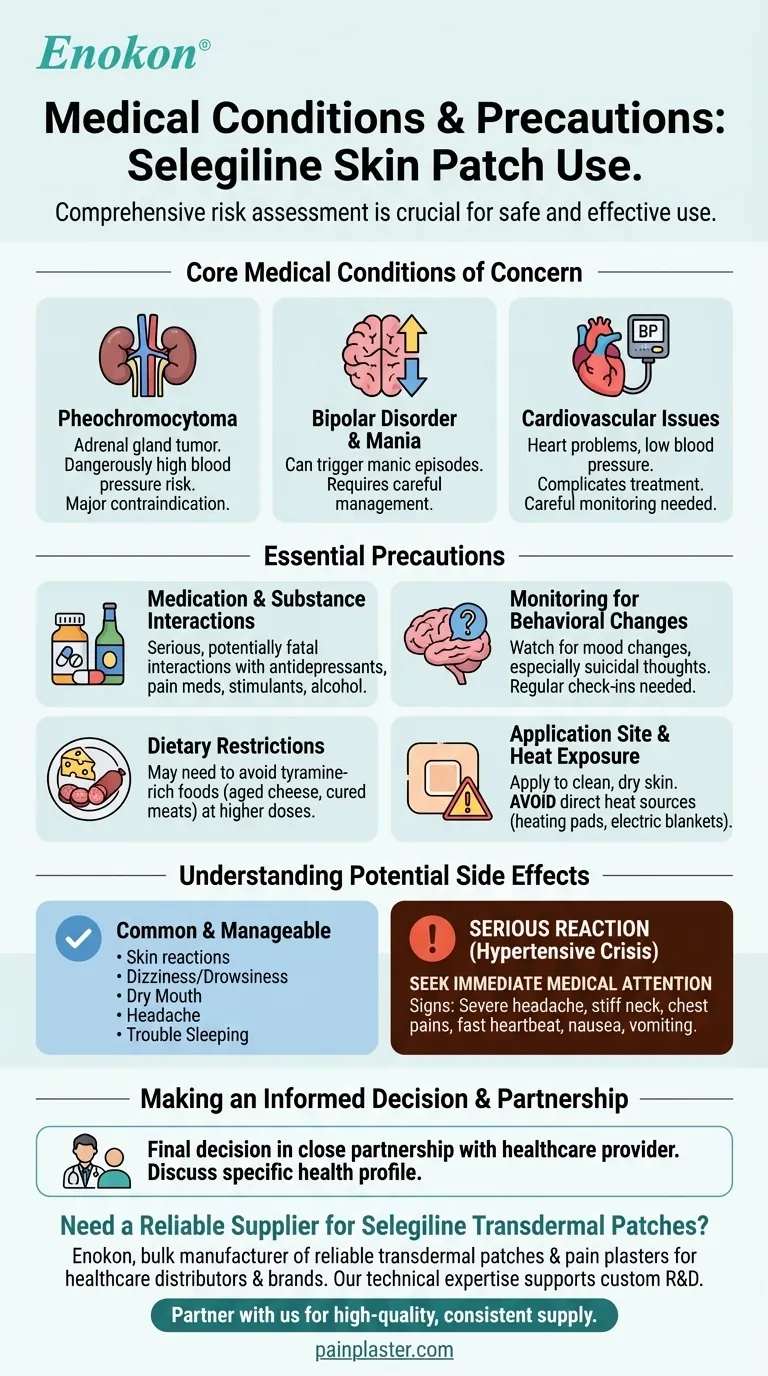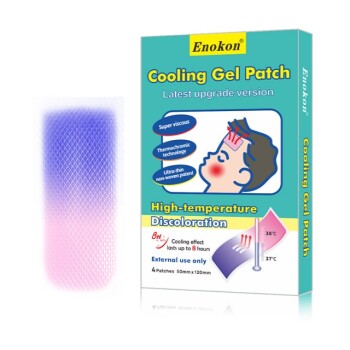Several key medical conditions require careful consideration before using a selegiline skin patch. These primarily include pheochromocytoma (a type of adrenal gland tumor), a history of bipolar disorder or mania, and certain cardiovascular problems like heart disease or low blood pressure. A full evaluation of your medical and mental health history is essential for determining if this medication is appropriate for you.
The decision to use a selegiline skin patch extends beyond a simple checklist of conditions. Safe and effective use depends on a comprehensive risk assessment conducted with your doctor, weighing your full health profile against the potential for serious interactions and side effects.

Core Medical Conditions of Concern
Certain pre-existing conditions can significantly increase the risks associated with the selegiline patch. It is critical to disclose these to your healthcare provider.
Pheochromocytoma
A pheochromocytoma is an adrenal gland tumor that can cause dangerously high blood pressure. Using a selegiline patch with this condition is a major contraindication.
Bipolar Disorder and History of Mania
For individuals with bipolar disorder or a personal history of mania or hypomania, selegiline can potentially trigger manic episodes. This risk must be carefully managed.
Cardiovascular Issues
A history of heart problems or chronic low blood pressure can complicate treatment. Selegiline can affect blood pressure regulation, requiring careful monitoring.
History of Other Mental Illness
A broader history of severe mental illness should also be discussed. Your doctor needs a complete picture to monitor for any potential adverse psychological effects.
Essential Precautions Beyond Pre-existing Conditions
Safe use of the selegiline patch involves more than just your medical history. Ongoing vigilance regarding interactions and side effects is critical.
Medication and Substance Interactions
Selegiline can have serious, sometimes fatal, interactions with many other substances. This includes prescription antidepressants, pain medicines, and stimulants, as well as over-the-counter drugs and alcohol.
Always provide your doctor with a complete list of every medication and supplement you take.
Monitoring for Behavioral Changes
Pay close attention to any changes in mood or behavior, particularly any new or worsening suicidal thoughts. Regular check-ins with your doctor are necessary to monitor your response to the medication.
Dietary Restrictions
You may need to avoid certain foods rich in a substance called tyramine, especially at higher doses of the patch. These foods can include aged cheeses, cured meats, and certain alcoholic beverages.
Application Site and Heat Exposure
The patch must be applied to clean, dry, and intact skin. It is crucial to avoid exposing the patch to direct heat sources like heating pads or electric blankets, as this can increase the amount of medication absorbed.
Understanding the Potential Side Effects
Like any medication, the selegiline patch has potential side effects ranging from mild to severe. Knowing what to watch for is a key part of safely managing treatment.
Common and Manageable Side Effects
More common side effects are often mild. These can include skin reactions at the patch site, dizziness, drowsiness, dry mouth, headache, or trouble sleeping.
Signs of a Serious Reaction
You must seek immediate medical attention if you experience symptoms of a hypertensive crisis. These warning signs include a severe headache, stiff neck, chest pains, a very fast heartbeat, nausea, and vomiting.
Making an Informed Decision with Your Doctor
The final decision should be made in close partnership with your healthcare provider. Discussing your specific health profile and goals will lead to the safest and most effective treatment plan.
- If you have a history of mental health conditions like bipolar disorder: You must discuss the specific risk of triggering manic episodes with your healthcare provider.
- If you have any form of heart disease or blood pressure issues: Your cardiovascular health must be carefully evaluated before and during your treatment.
- If you are taking any other medications (especially for pain or depression): You must provide a complete list to your doctor to prevent potentially dangerous drug interactions.
- If you are considering this treatment for an elderly patient: While specific age-related problems are not established, a comprehensive review of all health factors and medications is still essential.
A thorough and honest conversation with your healthcare provider is the essential first step to using this medication safely and effectively.
Summary Table:
| Condition/Precaution | Key Concern |
|---|---|
| Pheochromocytoma | Risk of dangerously high blood pressure (contraindicated). |
| Bipolar Disorder / Mania | Can trigger manic episodes. |
| Cardiovascular Issues | Can complicate blood pressure regulation. |
| Medication Interactions | Risk of serious interactions with other drugs. |
| Dietary Restrictions | May need to avoid tyramine-rich foods. |
Need a reliable supplier for selegiline transdermal patches?
As Enokon, a bulk manufacturer of reliable transdermal patches and pain plasters for healthcare and pharmaceutical distributors and brands, we understand the critical importance of medication safety and efficacy. Our technical expertise supports custom R&D and development to meet your specific requirements.
Partner with us to ensure high-quality, consistent supply for your patients. Contact our team today to discuss your needs.
Visual Guide

Related Products
- Far Infrared Deep Heat Relief Patches Medicated Pain Relief Patches
- Capsaicin Chili Medicated Pain Relief Patches
- Asthma Cough and Pain Relief Patch for Adults and Kids
- Far Infrared Pain Patch Relief Pain Reliever for Back
- Menthol Gel Pain Relief Patch
People Also Ask
- How do Deep Heat Pain Relief Patches provide pain relief? Discover the Drug-Free Mechanism
- What are pain relief patches and how are they used? A Guide to Safe, Targeted Relief
- How should pain relief patches be applied and used? A Guide to Safe & Effective Targeted Relief
- How do pain relief patches provide targeted relief? Discover the Science Behind Effective Pain Management
- How do pain relief patches compare to other pain relief methods? Discover Targeted, Long-Lasting Relief















